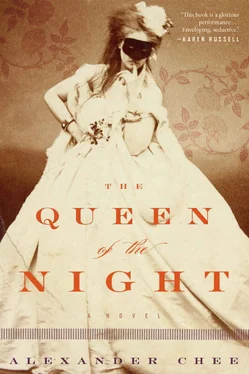The second room was red, and there were mirrors to the ceiling and paintings of men and women in mythic tableaux, all unfamiliar to me. The chamberlain stopped there and gave me whispered instructions on the presentation, how it was to be quick, that I would remain in the basement wardrobe service when I returned, but that after the presentation I was to be measured for the uniform I would wear in Compiègne. I wasn’t to address her or ask questions but only respond to any question she might direct at me.
And then he pulled a long ribbon outside the door, a bell rang, and I heard what I instantly knew was the Empress, a tired oui. He pushed the doors open to the Salon Bleu.
I sank to the floor as I entered, pushing my face down into the skirt of my dress. My first curtsy to her was clumsy, and I felt her stare. The two of them had a short conversation over my head, and I slowly turned to try to peek up at her despite the terrible danger of doing so. I was presented as you might a new hairbrush or hand mirror, a tool to be put out of sight as soon as it was used.
She was not the legendary beauty I now recognized from a few of the pictures I’d passed by in the imperial apartments, but she was still a very beautiful woman. She was the Andalusian, with her red hair that was sometimes light, sometimes dark. Her pale complexion was still smooth and unlined despite her love of sport. I tried not to stare at this woman I had dressed so often but had never seen. I looked down from her face to her fan, open and paused in its movement on her lap. She held a posy of Parma violets that shocked me for being fresh. On her fan were the painted figures of a man in dark armor kneeling at the feet of a beautiful woman. When it later became my job to care for it, I would know it was her favorite fan and that the picture was of Henry IV at the feet of Gabrielle d’Estrées, the woman whose love gave him the courage to be the great king of France he became. She was never, however, his queen.
It was an odd thing for an Empress to favor. But, as I would also learn, Eugénie loved dark omens and collected them scrupulously.
I was dismissed and left, returning to the dark, airless comfort of my basement palace. The seamstress measured me for my new uniform, and as she pulled the tape around my waist and batted my hands away, clucking her tongue at my size, a strange shame ran through me as I couldn’t remember the last time I’d been touched.
That night the eaves of the Tuileries constrained me in a way they never had before. Unable to sleep, I finally stood and went and looked out the tiny window. The lights made the palace seem made of a gold that glowed in the dark. I tried to imagine what Compiègne would be like. All that I could imagine, though, was the image from her fan. The man in armor bowing before the beautiful woman and the expressions of each.
Sorrow in the man, pleasure in the woman.
My role in the Empress’s destruction begins here.
DURING THE HEIGHT of her affair with the Emperor, the Comtesse had a special illusion door built inside her own so that the door could be open and appear closed, so that someone watching would be persuaded no one had come and gone when, in fact, someone had. I could never find it, but I thought of this each time I passed through.
I had never once seen the Emperor in the time I’d worked in the Tuileries, and as I waited in that doorway on this occasion, I understood I now likely would. As the door opened, as I entered with her butler, as I waited in her sitting room, I could feel, crossing in the air, the many paths of the man; could imagine his cloak, his clothes, his possession of her, still somehow complete after all this time. The door was still there for him to use if he should ever return. She’d had from him the passion that the Empress could feel missing in each part of the Tuileries she paced at night; it had come here and spent itself, and the air was still rich with it.
I left a note alongside the list as I passed the bowl this time, telling the Comtesse about the change in my position, and when she sat down at table at last, she held it up and then smoothed it against the wood by her place setting before looking up at me.
My dear, it’s excellent news, though we’ll need to be more careful. I will reflect on how this then changes your duties to me.
I only raised my eyebrows, waiting, and she laughed.
You are my “spy” in the basement. She laughed again. I’m sure he knows of our little meetings. I chose you because you are a grisette, because you are beneath notice. Because you are La Muette.
She paused as she said this, as if uncertain as to whether she had offended me, and then she pressed on.
When you are nearer the Empress, though, they will begin to observe you. And soon, if he does not already know, he will know. He may even have sent someone to follow you here today.
Terror at the idea of being discovered froze me in place. She smiled when she saw the change in my face.
It is important for him to know I’m spying on what she wears. I’m sure it will amuse him to think I am plotting something involving how many crinolines she wears, something like this. She gestured at her dress.
Looking up at me again, she said, It’s important because then he’ll allow it, and in doing so, he’ll believe he controls the result.
She was lit by the single candle near her at that end of her table, her beautiful red hair rising loose in curls.
He won’t, she said.
I returned to cutting the duck leg in front of me.
If anything, it’s quite the opposite, she said to me. She is so odd, she said. It is, in fact, she who is always copying the fashions of his mistresses, copying the women she has lost to, as if she can win by imitating them. She is the spy of the crinolines. She is always befriending them.
And then she paused and raised her glass. All of them except me, she said. Her eyes glittered, as if she had won a prize of great worth.
During the time of the liaison between the Emperor and the Comtesse, the Empress had been recovering from the birth of the Prince; she sickened and took to bed for much of the year. If the Emperor understood this as a comment on his affair, he had responded by continuing it.
You’re in no danger, she said. In fact, if you are already known to him, I would say you are meant to be a taunt to me, full of tales of what I can never have that you, my muette , cannot ever tell me. It is their revenge on me to bring you, I’m sure. For I am not allowed at Compiègne.
As I listened, she began to tell me of who would be at Compiègne, as well as the story of her banishment, but I could not quite hear it. I raised the fork to my mouth and paused to look at the delicate meat, pink at the center, before setting it in my mouth. I was careful not to betray any change in my expression as the thought came to me.
She was indifferent as to whether my errand for her resulted in my arrest or death.
The dinner finished soon after that. She called for paper, a pen, and ink.
I want you to copy out an address several times until you can do it from memory, she said. It is not this address, as it would immediately place you under suspicion.
I sat and did as she asked, writing it out, writing it out, writing it out with a terrible effort to keep my hand steady. 7 Place Vendôme, 7 Place Vendôme, again and again.
Very good, she said. Now then, I would like you to record what she wears during the series, a much greater task, as she will be changing approximately four to five times a day. You will post the list to this address from town. During this period, I will pay you a raise, to be collectively paid on your return. Are we agreed?
Читать дальше












